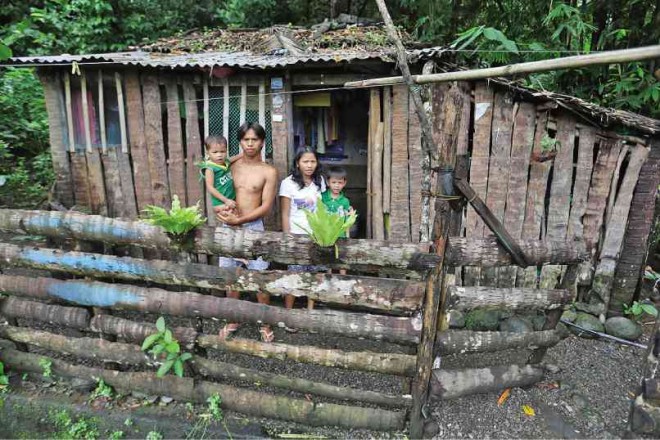3 towns learn from landslide tragedy

MODESTO Manuguid, now 25 and with a family, is one of the four residents of Barangay Tignoan in Real town, Quezon province, who survived the collapse of Repador building after Typhoon “Winnie” struck in 2004. They endured 10 days without food under the rubble of concrete, steel and mud. REM ZAMORA
Ian Carlo Bungag still shows signs of nervousness and would not talk with visitors, according to his father. But Maria Tamares says she is no longer bothered by sleepless nights, especially during strong rains and storms.
They were among four residents of Barangay Tignoan in Real town, Quezon province, who were miraculously saved by soldiers from the collapsed Repador building 10 days after flash floods and a landslide triggered by Typhoon “Winnie” swamped their neighborhood on Nov. 29, 2004. More than 1,500 people, however, died in Real, Infanta and General Nakar towns.
Bungag, Tamares and her 3-year-old granddaughter Stella Marie Sur, and teenager Modesto Manuguid were found in a cramped space under the rubble of concrete, steel and mud, amid the stench of rotting human bodies.
On Saturday, a decade later, the tragedy was remembered with prayers and a program at the Infanta town plaza. Mayor Rodante Potes said that instead of remembering the devastation and misery brought by the calamity, the town chose to focus on the “heroism, sacrifices and joint efforts of Infantahins to recover from the disaster.”
Residents in Barangay Tignoan in Real held communal prayers that day at their chapel, where they also heard Mass. They lighted candles and offered flowers at the site of the building toppled by the landslide, burying over a hundred villagers who sought refuge there.
Article continues after this advertisement“We also held a tree-planting activity at the hill in front of the tragedy site,” said Ariel Montes, the barangay chair.
Article continues after this advertisementRampant logging
Massive logging in the Sierra Madre mountain ranges had been blamed for the 2004 tragedy that also destroyed billions of pesos worth of property.
At the height of continuous rains brought by three successive typhoons, the Agos River between Infanta and General Nakar overflowed. The towns were inundated with mud and water, and brought along its deadly path huge logs and other forest debris cascading from the Sierra Madre where the river originates.
More than 900 people died in the flash flood in Infanta. The number of fatalities in General Nakar reached several hundreds, including more than 100 Agta tribal members.
In Real, at the height of the storm on the evening of Nov. 29, an avalanche of mud and water from the hilly portion across the road knocked down the two-story Repador building, burying more than a hundred people who sought shelter inside.
Tamares now talks of recovering from the trauma. Her granddaughter Stella and her father, Melvin, moved to Laguna three years ago. Melvin lost his wife and a son in the tragedy.
Bungag, now 24, however, refused to be interviewed by this correspondent, who visited him on Thursday. Manuguid was fishing in the open sea at that time.
Preparedness
Infanta Councilor Rex Gamara said that since the 2004 tragedy, the local government and its citizens have become more aware of their obligation to protect the environment.
Then Mayor Filipina Grace America, now the vice mayor, formulated and started implementing a novel “Community-Based Disaster Preparedness and Management Program” that mobilized the whole community to readily face future calamities.
All residents have learned to adopt the four Ps—predict, plan, practice and prepare—in their day-to-day existence, said Gamara, chair of the municipal council’s committee on environment and disaster management.
In General Nakar, Jing Astejada, municipal environment officer, said the local government had been strictly enforcing its “forest-land-use plan” to protect the fragile Sierra Madre mountain ranges inside their territory.
Mayor Leovigildo Rozul said only “isolated cases” of timber poaching had been reported in the Sierra Madre.
Despite the lull in massive logging activities, the people of northern Quezon have become wary of a repeat of the 2004 disaster.
On Sept. 14, the local government of Infanta adopted a resolution strongly opposing the construction of two dams—Kaliwa and Laiban—in Tanay town, Rizal province, and in General Nakar, citing lack of public consultation and threats of environmental destruction.
Dam projects
The dams would be built somewhere between the Marikina and Real-Infanta fault lines, and some quarters in northern Quezon said they had yet to get assurance that should there be an earthquake, these would not suffer cracks and submerge Infanta and General Nakar.
President Aquino, in his State of the Nation Address in July, said the dam projects, which would supply Metro Manila with potable water, were among several public-private partnership programs he had approved for immediate implementation.
“As long as the mega-dam project in the Sierra Madre continues to be pushed by the government and big companies, our tribe and the lowlanders will remain restive,” said Ramcy Astoveza, an Agta chieftain.